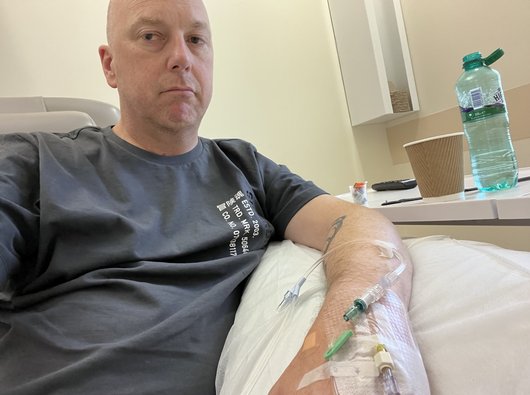Side effects of treatment for follicular lymphoma
Treatment for follicular lymphoma can cause side effects, but everyone reacts differently. Side effects usually go away when treatment ends, but could last longer.
Key things to know
- It’s common for people having treatment for follicular lymphoma to get side effects, but this doesn’t mean you’ll get any.
- If you do experience side effects, tell your hospital team – they should be able to recommend something that can help.
- People with blood cancer are more likely to pick up infections, which can be life threatening. Make sure you know the symptoms of an infection and what to do if you suspect you have one.
Chemo-immunotherapy side effects
Lots of people get side effects from taking chemotherapy drugs, but not everyone will experience the same ones. And some people might not get any at all.
Side effects may also vary from being mild to more severe, and they can come and go during your treatment.
Common side effects of chemotherapy and immunotherapy drugs include:
- sickness and vomiting (nausea)
- fatigue
- hair loss
- sore mouth (mucositis)
- itchy or painful skin
- problems with memory or concentration (brain fog, sometimes called ‘chemo brain’)
- changes to your sense of taste and smell
- loss of appetite, with or without weight loss
If you do experience any of these side effects and find them too difficult to cope with, tell your doctor or nurse. They may be able to give you something to help (for example, anti-sickness medicine) or they could suggest some tips you can try yourself at home.
You can also give us a call, or join our online community forum to speak to people in a similar situation who can share advice about what worked for them.
It’s worth noting that most side effects of treatment will disappear or improve once your treatment is over.
"I did get a few side effects during chemo, mainly nausea and vomiting, and I was surprised when my beard hair and my eyebrows and eyelashes fell out – I thought as a bald guy I’d escape the hair loss!"
Russell, diagnosed with follicular lymphoma in 2024. Read his story about why it's important to listen to your body and seek help when you need it.

Radiotherapy side effects
Side effects from radiotherapy depend on which part of your body has been treated, and how many sessions you have had. Some people experience sore or itchy skin, which can turn red or darker than usual.
If you do get any side effects from radiotherapy, speak to your hospital team. They may be able to suggest something to help.
Steroids side effects
You may be given steroids as part of your treatment. Most people will have a steroid called prednisolone. Prednisolone and other steroids can cause temporary side effects such as:
- weight gain
- difficulty sleeping
- a puffy or swollen face, due to the build-up (retention) of water
- increased appetite
- mood swings, including feeling agitated more than usual.
Side effects from steroids should disappear once you’ve finished your treatment.
"When you're not well and you've got to travel to hospital all the time, it's a lot. It's hard to get up and get yourself together. But I just told myself, OK, let's do it. And I got through it."
Sue, living with follicular lymphoma since 2016. Read more real stories from people affected by blood cancer.

Infection and neutropenia
People with follicular lymphoma are at higher risk of getting infections that develop quickly and are more serious than usual.
You are at particular risk while you are having treatment. This is because most treatments for blood cancer affect your immune system, and can cause neutropenia – a lack of white blood cells called neutrophils.
If you have neutropenia, you can develop neutropenic sepsis from an infection.
Sepsis is life-threatening, and a medical emergency. Call 999 or go straight to A&E if you think you could have sepsis.
Symptoms of an infection
It’s very important that you and the people around you learn the signs of an infection, and get medical help if you develop any of them. If you’re having treatment, you should be given a number to call by your hospital team. If you don’t have access to this number, try NHS 111 or your GP, or go to A&E and tell them you’re having treatment for follicular lymphoma.
Symptoms of an infection include:
- feeling hot or cold (a temperature that’s higher or lower than normal)
- a sore throat
- a cough producing green mucus
- frequent watery poos (diarrhoea)
- being sick (vomiting)
- feeling dizzy or faint
- headache or stiff neck
- skin feeling red, hot or swollen
- burning or stinging when you wee, or passing a small amount of wee
- generally not feeling well.
Read more about infections, sepsis and neutropenia, including how to prevent infection.
Sex and fertility
Having follicular lymphoma shouldn't stop you from having a family, but there are some things you should be aware of.
If you think you might want to start a family or have more children at some stage, tell your hospital team as soon as possible. There’s a chance your fertility may be affected by the treatment you need. If this applies to you, you can ask your doctor to explain how you might be able to preserve your fertility, or get it back in the future. Your options may include freezing eggs, sperm or embryos before starting treatment.
It’s important to know that some drugs, including chemotherapy, can be passed on to a partner through sex. Use a barrier method of contraception if you’re sexually active during treatment, and speak to your hospital team if you don’t use contraception for whatever reason.
Because eggs and sperm can be affected by treatment for follicular lymphoma, you should also avoid getting pregnant or making someone else pregnant while you are having treatment. Wait until your doctor tells you it’s safe to conceive again after treatment ends.
Long term or late effects
Treatment for follicular lymphoma can cause long term side effects. Some long-term effects get better over time, while others may be permanent. Some side effects might not even start until years later – these are called late effects.
Your doctor will explain more about long term effects or late effects if they are relevant to the treatment you’re having. If you are at risk, you’ll have tests to check for them and be told any signs and symptoms to look out for.
Getting help with side effects
Don’t feel you have to cope with side effects alone. Tell your hospital team about any side effects that you get or are worried about, as there are treatments they can prescribe that might help. If the first treatment they suggest doesn’t work, let them know. There are often other things they can try.
You might also find it useful to read our general information about side effects. It includes tips and suggestions for things you might be able to do at home, and ideas about where to turn for more support.

Join our Online Community Forum
Use our supportive Online Community Forum to connect with others affected by blood cancer and share your experiences. You can also explore our 'ask the nurses' threads to hear from our nurses about topics such as active monitoring.
More About This